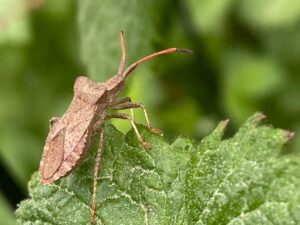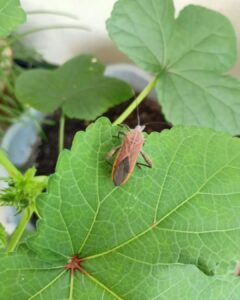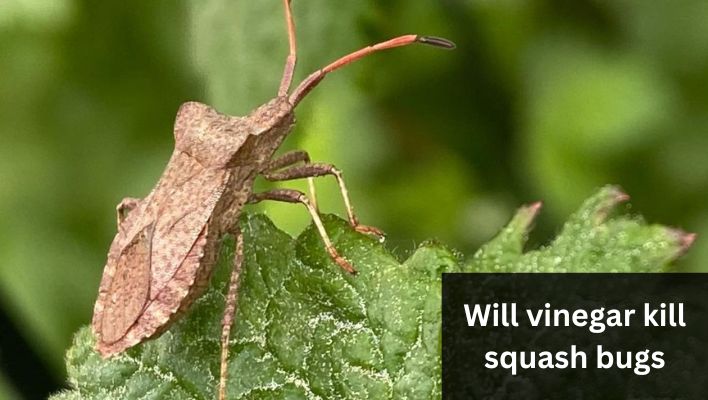Are you tired of those pesky squash bugs wreaking havoc on your beloved garden? Well, fret no more, because we’re about to delve into an intriguing solution that might just be the answer you’ve been seeking: vinegar.
Yes, you read that right! Vinegar, that humble kitchen staple, has emerged as a potential weapon in the battle against squash bugs.
Gone are the days when toxic chemicals were the only option for pest control. As conscientious gardeners, we’re increasingly turning to nature-friendly alternatives that not only protect our plants but also safeguard the environment.
Vinegar, with its incredible versatility and natural properties, has captured the attention of many garden enthusiasts seeking a safe and effective solution. With its acidic nature and potential to disrupt the respiratory systems of squash bugs, vinegar might just hold the key to reclaiming your garden from these persistent pests.
In this article, we’ll explore the fascinating world of natural pest control and investigate whether vinegar truly has the power to eliminate these garden pests.
So, grab your gardening gloves, and let’s dive into the wonders of vinegar and its potential to conquer the squash bug invasion.
Understanding Squash Bugs
When it comes to maintaining a flourishing garden, one of the greatest challenges is dealing with unwanted pests. Among the many culprits, squash bugs have earned quite a notorious reputation.
These small insects, scientifically known as Anasa tristis, can wreak havoc on your precious squash plants and even pose a threat to other related crops.
Squash bugs are adept at survival and reproduction, making them a formidable adversary for any gardener. Their life cycle typically begins in the early spring when adult bugs emerge from overwintering sites, such as garden debris or nearby vegetation.
These cunning insects have a knack for sniffing out their favorite hosts, including various species of squash, pumpkins, and cucumbers. Once squash bugs find their ideal feeding ground, they waste no time causing mayhem.

They possess a needle-like mouthpart that they use to pierce plant tissues and extract sap, sapping vital nutrients and weakening the plant’s overall health. If left unchecked, a severe infestation of squash bugs can lead to stunted growth, wilted leaves, and ultimately, reduced crop yields.
To make matters worse, squash bugs are also skilled at reproduction. After feeding on your beloved squash plants, the females lay clusters of copper-colored eggs on the undersides of leaves.
These eggs eventually hatch into nymphs, which undergo several molts before reaching adulthood. The entire life cycle of squash bugs can be completed within a matter of weeks, meaning that populations can multiply rapidly if not controlled.
The Role of Vinegar in Pest Control
When it comes to natural pest control, vinegar has gained popularity as an effective and eco-friendly option. This section will explore the potential benefits of using vinegar as a natural insecticide, how it works as a contact pesticide against certain pests, and highlight its eco-friendly nature and low toxicity to plants.
- The Potential Benefits of Using Vinegar as a Natural Insecticide: Vinegar, particularly white vinegar or apple cider vinegar, has been found to have insecticidal properties that can help combat pests in your garden. It offers several advantages as a natural pest control method, including affordability, accessibility, and being free from harmful chemicals that can harm beneficial insects or pose risks to human health.
- Vinegar as a Contact Pesticide: Vinegar acts as a contact pesticide, which means it works by directly coming into contact with pests, rather than through systemic or residual effects. When vinegar comes into contact with certain insects, including squash bugs, it can disrupt their respiratory system and cause damage to their exoskeletons. This can ultimately lead to the demise of the pests.
- Eco-Friendly Nature and Low Toxicity to Plants: One of the significant advantages of using vinegar as a pest control method is its eco-friendly nature. Unlike synthetic pesticides, vinegar is biodegradable and does not persist in the environment. It breaks down naturally, minimizing the risk of contaminating soil, and water sources, or harming non-target organisms. Moreover, vinegar is considered relatively safe for plants when used in moderation, making it a preferable choice for organic gardeners.
However, it’s important to note that while vinegar can be effective against certain pests, its efficacy may vary depending on factors such as the specific pest species, the stage of the pest’s life cycle, and the concentration and application method of vinegar. It’s always a good idea to conduct a small-scale test before applying vinegar to your entire plant or garden.

Vinegar’s Effectiveness on Squash Bugs
Many gardeners have claimed that vinegar is an effective tool for controlling squash bugs. Below we will explore the common claims regarding vinegar’s effectiveness on squash bugs, the potential mechanisms behind its impact on these pests, and any scientific studies or anecdotal evidence supporting vinegar’s efficacy.
Common Claims Regarding Vinegar’s Effectiveness on Squash Bugs:
Gardeners often assert that vinegar can kill squash bugs on contact or deter them from infesting plants. The acidic nature of vinegar is believed to be the key factor in its effectiveness against these pests. However, it’s important to examine the scientific basis behind these claims.
Potential Mechanisms Behind Vinegar’s Impact on Squash Bugs:
Vinegar’s effectiveness against squash bugs can be attributed to its acidity. When vinegar comes into contact with these pests, it can disrupt their respiratory systems and cause damage to their exoskeletons. The acetic acid in vinegar is believed to be the primary component responsible for these effects.
Scientific Studies and Anecdotal Evidence:
While scientific research specifically focused on vinegar’s impact on squash bugs may be limited, there is anecdotal evidence from gardeners supporting its efficacy. Many gardeners have reported positive results when using vinegar as a pest control method for squash bugs. However, it’s important to approach anecdotal evidence with caution, as individual experiences may vary.
Additionally, vinegar has been studied for its insecticidal properties against other pests. For example, a study published in the Journal of Economic Entomology examined the efficacy of acetic acid, the main component of vinegar, against aphids. The study found that acetic acid effectively killed aphids upon contact, supporting the notion that vinegar could potentially be effective against other pests as well.
It’s worth noting that vinegar may not be a standalone solution for long-term squash bug control. Incorporating vinegar into a comprehensive pest management strategy that includes other natural methods and good gardening practices is likely to yield the best results.
Conducting an Experiment
To determine the effectiveness of vinegar in controlling squash bugs, conducting a controlled experiment can provide valuable insights. This section will outline a hypothetical experiment, including the steps involved, such as preparing a vinegar spray and applying it to affected plants. Additionally, we will emphasize the importance of experimenting in a controlled environment for accurate results.
- Setting up the Experiment: Choose a controlled environment, such as a greenhouse or a designated area in your garden, to experiment. Select healthy squash plants that are infested with squash bugs, ensuring consistency in the number and severity of infestations across the plants.
- Preparing the Vinegar Spray: Dilute vinegar with water in a spray bottle, using a 1:1 ratio or adjusting the concentration based on the severity of the infestation. It’s important to use white vinegar or apple cider vinegar for this purpose. Be sure to label the spray bottle and avoid using concentrated vinegar directly on the plants, as high acidity may damage the foliage.
- Applying the Vinegar Spray: Carefully spray the vinegar solution on the affected plants, focusing on the areas where squash bugs are present. Ensure thorough coverage, including the undersides of leaves and stems. Take note of the time of application, as it may be necessary to reapply the vinegar spray periodically.
- Monitoring and Observations: Regularly monitor the treated plants and observe the effects of the vinegar spray on squash bugs. Keep a record of any changes in pest activity, including reductions in population, mortality rates, or behavioral changes. Note any visual effects on the plants themselves, such as leaf discoloration or wilting, to assess any potential negative impacts.
- Control Group: To establish a baseline for comparison, maintain a control group of infested plants that are not treated with vinegar spray. This allows for a comparison of the effectiveness of the vinegar treatment against the natural progression of squash bug infestation.
- Statistical Analysis: Once sufficient data is collected, analyze the results statistically to determine the impact of vinegar on squash bugs. Compare the pest population trends, mortality rates, and overall plant health between the vinegar-treated group and the control group.
It’s important to conduct this experiment in a controlled environment to minimize external factors that could influence the results. Factors such as temperature, humidity, sunlight exposure, and other environmental variables should be kept consistent throughout the experiment. This controlled approach helps ensure reliable and accurate findings.
Factors Affecting Vinegar’s Performance
When using vinegar as a squash bug repellent, several factors can impact its effectiveness. Below, we will discuss the importance of proper application techniques, the significance of vinegar concentration and purity, and mention potential limitations or challenges when using vinegar as a squash bug repellent.
- Proper Application Techniques: Proper application techniques are essential for maximizing the effectiveness of vinegar as a squash bug repellent. Ensure thorough coverage by spraying the vinegar solution directly on the affected areas, including the undersides of leaves and stems where squash bugs often hide. Additionally, consistency in reapplication, following the instructions and recommended frequency, can help maintain the deterrent effect.
- Vinegar Concentration and Purity: The concentration of vinegar used in the spray can affect its effectiveness. For most pests, including squash bugs, a 1:1 ratio of vinegar to water is often recommended. However, adjusting the concentration based on the severity of the infestation may be necessary. It’s important to use white vinegar or apple cider vinegar for this purpose, as other types of vinegar, such as balsamic vinegar, may contain additives that could harm plants.
- Limitations and Challenges: While vinegar can be a useful tool in controlling squash bugs, it’s important to recognize its limitations. Vinegar primarily works as a contact pesticide, meaning it needs direct contact with the pests to be effective. This can pose challenges when dealing with pests that hide in hard-to-reach areas or those that have a waxy coating, which may reduce the vinegar’s efficacy. Regular monitoring and thorough application can help overcome these challenges.
- Another limitation is the potentially temporary nature of vinegar’s effects. Squash bugs may eventually adapt to the vinegar spray or become less responsive to it over time. Therefore, using vinegar as part of an integrated pest management approach that includes other control methods, such as companion planting or physical barriers, is recommended for long-term effectiveness.
Additionally, while vinegar is considered relatively safe for plants, it’s essential to test it on a small area before widespread application. Some plants may be more sensitive to vinegar than others, and excessive or repeated applications can lead to leaf discoloration or other adverse effects. Moderation is key when using vinegar as a pest control method.
By understanding these factors and implementing proper techniques, you can optimize the performance of vinegar as a squash bug repellent. In the next section, we will address frequently asked questions related to using vinegar for squash bug control. Stay tuned to learn more!
Steps to Use Vinegar for Squash Bug Control
Using vinegar as a natural pest control method for squash bugs can be an effective and environmentally friendly approach. Below, we will provide a step-by-step guide on preparing and using vinegar spray, emphasize safety measures and precautions for handling vinegar, and offer tips on identifying and targeting squash bug-infested areas.
Prepare the Vinegar Spray
- Use white vinegar or apple cider vinegar for this purpose.
- Dilute vinegar with water in a spray bottle, maintaining a 1:1 ratio. Adjust the concentration if necessary, based on the severity of the infestation.
- Gently shake the spray bottle to ensure proper mixing of vinegar and water.
Safety Measures and Precautions:
- Wear protective gloves and goggles while preparing and using the vinegar spray to avoid contact with the eyes or skin.
- Work in a well-ventilated area to minimize inhalation of vinegar fumes.
- If you have sensitive skin or respiratory conditions, consider wearing a mask or using additional protective gear.
Identify and Target Squash Bug-Infested Areas
- Regularly inspect your squash plants for signs of squash bug activity. Look for eggs, nymphs, and adult bugs on the leaves, stems, and undersides of leaves.
- Pay close attention to areas where squash bugs tend to congregate, such as leaf axils, the base of the plant, or along the veins of leaves.
Apply the Vinegar Spray:
- Spray the vinegar solution directly on squash bug-infested areas, ensuring thorough coverage.
- Pay particular attention to the undersides of leaves and areas where eggs or nymphs are present.
- For adult squash bugs, direct the spray toward their bodies to maximize the contact and effectiveness of the vinegar.
Reapply and Monitor:
- Depending on the severity of the infestation and weather conditions, you may need to reapply the vinegar spray periodically.
- Monitor the treated plants regularly to assess the effectiveness of the vinegar spray in reducing squash bug populations.
- Keep a record of any changes in pest activity, including reductions in the number of bugs or improvements in plant health.
Remember, vinegar is most effective as a short-term solution for controlling squash bugs. It is recommended to combine vinegar with other pest control methods, such as companion planting, physical barriers, or regular garden maintenance, for long-term prevention.
By following these steps, taking necessary safety precautions, and implementing vinegar spray with consistency, you can help deter squash bugs and protect your squash plants naturally.

Alternative Natural Methods for Squash Bug Control
In addition to using vinegar, there are several alternative natural methods you can incorporate into your squash bug control strategy. These methods can complement each other and provide a more comprehensive approach to managing squash bug infestations. Here are some alternative natural methods for squash bug control:
- Neem Oil: Neem oil is derived from the neem tree and has insecticidal properties. It can disrupt the life cycle of squash bugs by affecting their feeding, growth, and reproduction. Dilute neem oil according to the instructions on the product and apply it to the affected plants, targeting the squash bugs and their eggs.
- Insecticidal Soap: Insecticidal soap is a gentle and effective method for controlling squash bugs. It works by suffocating the pests upon contact. Use a commercially available insecticidal soap or make your own by diluting mild liquid soap in water. Spray the solution directly on the squash bugs, ensuring thorough coverage.
- Diatomaceous Earth: Diatomaceous earth is a natural powder made from fossilized diatoms. It contains sharp microscopic particles that can penetrate the exoskeleton of insects, including squash bugs, leading to their dehydration and eventual death. Apply diatomaceous earth around the base of the plants and on the leaves where squash bugs are present.
- Companion Planting: Certain plants have natural repellent properties that can help deter squash bugs. Consider interplanting your squash with repellent plants such as radishes, nasturtiums, catnip, or tansy. These companion plants can help confuse and repel squash bugs, reducing their attraction to your squash plants.
- Physical Barriers: Implementing physical barriers can help protect your squash plants from squash bugs. Use floating row covers or fine mesh netting to cover the plants, creating a barrier that prevents squash bugs from accessing them. Be sure to secure the covers tightly to prevent pests from entering.
- Handpicking: Regularly inspect your squash plants and manually remove squash bugs, nymphs, and eggs by hand. Wear gloves and drop them into a bucket of soapy water to eliminate them. This method is labor-intensive but can be effective, especially when combined with other control methods.
- Garden Hygiene: Practicing good garden hygiene can reduce the likelihood of squash bug infestations. Clean up plant debris, fallen leaves, and other organic matter where squash bugs may hide and overwinter. This eliminates potential breeding sites and reduces the pest’s ability to establish a population.
- Companion Planting with Alliums: Planting alliums such as garlic, onions, or chives near your squash plants can help repel squash bugs. The strong odor and compounds released by these plants can deter pests and reduce their infestation.
- Beneficial Nematodes: Beneficial nematodes are microscopic organisms that can target and parasitize squash bug larvae in the soil. These nematodes are commercially available and can be applied to the soil around your squash plants according to the instructions provided.
- Kaolin Clay: Kaolin clay is a natural clay powder that forms a physical barrier on the leaves of plants. When applied as a spray, it creates a white film that repels and confuses squash bugs, reducing their feeding and egg-laying activities. Follow the product instructions for application.
- Essential Oils: Certain essential oils, such as peppermint, spearmint, or rosemary oil, have insect-repellent properties. Dilute a few drops of the chosen oil in water and spray it on your squash plants to deter squash bugs. Be sure to test the oil on a small area first to check for any adverse effects on the plants.
- Reflective Mulch: Placing reflective mulch, such as aluminum foil or reflective plastic, around the base of your squash plants can create a deterrent for squash bugs. The reflective surfaces confuse and deter the pests, reducing their likelihood of infesting the plants.
- Intercropping with Radishes: Interplanting radishes with your squash plants can help repel squash bugs. The strong aroma of radishes acts as a natural deterrent, making the area less appealing to squash bugs.
- Vacuuming: Using a handheld vacuum with a narrow attachment, gently vacuum up squash bugs, nymphs, and eggs from your plants. Dispose of the contents in a sealed bag to prevent their escape. This method is most effective when squash bugs are in small numbers or concentrated in specific areas.
- Organic Sprays: Explore organic sprays made from natural ingredients, such as pyrethrin or insecticidal extracts from plants like pyrethrum or derris. Follow the instructions carefully when using these sprays to ensure safety and effectiveness.
Remember to monitor your squash plants regularly, employ a combination of control methods, and adapt your approach based on the severity of the infestation. By using these alternative natural methods, you can create a balanced and sustainable approach to managing squash bugs in your garden.
Also, note that the effectiveness of these alternative natural methods may vary depending on the severity of the infestation and other environmental factors.
It is often most effective to combine multiple methods and regularly monitor your plants for signs of squash bugs. By employing a holistic approach, you can create a more sustainable and successful control strategy.

Will Vinegar Kill Squash Bugs FAQs
Will vinegar kill squash bugs on contact?
Vinegar has shown some effectiveness in killing squash bugs on contact. The acetic acid present in vinegar can disrupt the exoskeleton and respiratory systems of pests, including squash bugs.
When sprayed directly on the bugs, vinegar can cause damage and lead to their demise. However, it’s important to note that vinegar primarily acts as a contact pesticide, meaning it needs direct contact with the pests to be effective.
Can vinegar prevent squash bugs from infesting plants?
While vinegar can help deter squash bugs and potentially reduce their population, it may not entirely prevent them from infesting plants. Squash bugs are persistent pests, and they may adapt to vinegar over time.
It is recommended to combine vinegar with other integrated pest management (IPM) strategies, such as companion planting, physical barriers, or beneficial insect attraction, to create a more comprehensive defense against squash bugs.
Are there any precautions when using vinegar as a pest control method?
Yes, there are precautions to consider when using vinegar as a pest control method:
- Protect yourself: Wear gloves and goggles when handling vinegar to avoid contact with the eyes or skin. If you have sensitive skin or respiratory conditions, consider wearing a mask or using additional protective gear.
- Test on a small area: Before applying vinegar spray to your entire plant, test it on a small area to ensure the plant’s tolerance and avoid any adverse effects, such as leaf discoloration or wilting.
- Proper concentration: Use the recommended concentration of vinegar, usually a 1:1 ratio with water, or adjust it based on the severity of the infestation. Using higher concentrations may increase the risk of plant damage.
- Consider plant sensitivity: Some plants may be more sensitive to vinegar than others. Monitor the plants closely after application and discontinue use if signs of plant stress or damage occur.
Is vinegar a long-term solution for squash bug control?
Vinegar is not considered a long-term solution for squash bug control on its own. While vinegar can provide some temporary deterrence and reduction in squash bug populations, pests may adapt to the vinegar spray over time.
To achieve long-term squash bug control, it is recommended to incorporate a combination of strategies, such as IPM techniques, cultural practices, and regular monitoring, along with vinegar spray. This integrated approach helps create a more sustainable and effective management plan.
Conclusion
Vinegar can be a useful tool in managing squash bug infestations. Its acetic acid content can disrupt the exoskeleton and respiratory systems of these pests, making it an effective contact pesticide. However, vinegar alone may not provide a long-term solution for squash bug control.
It is recommended to combine vinegar with other integrated pest management (IPM) strategies, such as companion planting, physical barriers, and beneficial insect attraction, to create a more comprehensive defense against squash bugs.
When using vinegar as a pest control method, it is important to take precautions, such as wearing protective gear and testing the spray on a small area of the plant.
Different concentrations of vinegar may be required depending on the severity of the infestation, and it is essential to monitor the plants closely for any signs of stress or damage.
Additionally, it’s important to recognize that vinegar primarily acts as a contact pesticide and may not entirely prevent squash bugs from infesting plants.
To achieve long-term squash bug control, it is advisable to implement cultural practices, maintain garden hygiene, encourage beneficial insects, and consider other organic insecticides in conjunction with vinegar.
By adopting an integrated approach and staying vigilant with monitoring and preventive measures, you can effectively manage squash bug populations and protect your squash plants.
By combining knowledge, experimentation, and a proactive approach, you can create a healthy and thriving garden while minimizing the impact of squash bugs.

